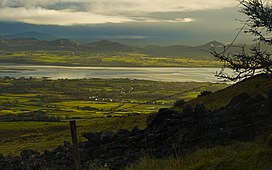Ox Mountains: Difference between revisions
m en-IE |
m Task 18 (cosmetic): eval 3 templates: hyphenate params (3×); |
||
| Line 24: | Line 24: | ||
== Geography == |
== Geography == |
||
The highest peak in the Ox Mountains is [[Knockalongy]], which is {{convert|544|m|ft}} high.<ref>{{cite web|title=Ox Mountains|work=MountainViews|url=http://mountainviews.ie/mv/index.php?mtnindex=366| |
The highest peak in the Ox Mountains is [[Knockalongy]], which is {{convert|544|m|ft}} high.<ref>{{cite web|title=Ox Mountains|work=MountainViews|url=http://mountainviews.ie/mv/index.php?mtnindex=366|access-date=24 February 2009}}</ref> |
||
[[File:Culleenamore beach.jpg|thumb|View from Culleenamore beach of [[Knockalongy]], the range's highest peak]] |
[[File:Culleenamore beach.jpg|thumb|View from Culleenamore beach of [[Knockalongy]], the range's highest peak]] |
||
The mountains begin immediately southwest of [[Ballysadare]], and run west-southwest for some forty miles to the boundary of [[County Mayo]], where they are continued to the southwest by the Slieve Gamph range, which runs first on the boundary of the two counties, and then into Mayo. The mountains have several summits from 1,200 to 1,800 feet high; and Slieve Gamph reaches 1,363 feet.<ref name="LI">{{cite web|title=Description of County Sligo from ''Atlas and Cyclopedia of Ireland'' (1900)|work=Library Ireland|url=http://www.libraryireland.com/Atlas/Sligo.php| |
The mountains begin immediately southwest of [[Ballysadare]], and run west-southwest for some forty miles to the boundary of [[County Mayo]], where they are continued to the southwest by the Slieve Gamph range, which runs first on the boundary of the two counties, and then into Mayo. The mountains have several summits from 1,200 to 1,800 feet high; and Slieve Gamph reaches 1,363 feet.<ref name="LI">{{cite web|title=Description of County Sligo from ''Atlas and Cyclopedia of Ireland'' (1900)|work=Library Ireland|url=http://www.libraryireland.com/Atlas/Sligo.php|access-date=24 February 2009}}</ref> |
||
==Geology== |
==Geology== |
||
[[Gneiss]], [[schist]] and [[granite]] form the bedrock of the Ox Mountains. This wild area of uplands is covered largely with [[blanket bog]]. Some parts are extensively forested, whilst others have numerous outcroppings of rock. To the north and south the land is underlain by [[limestone]]s and [[sandstone]]s of [[Carboniferous]] age, and is generally farmland.<ref>{{cite web|title=Walks in the Ox Mountains|work=Geological Survey of Ireland|url=http://www.gsi.ie/Education/Sites+Walks+Field+Trips/Walks+in+the+Ox+Mountains.htm| |
[[Gneiss]], [[schist]] and [[granite]] form the bedrock of the Ox Mountains. This wild area of uplands is covered largely with [[blanket bog]]. Some parts are extensively forested, whilst others have numerous outcroppings of rock. To the north and south the land is underlain by [[limestone]]s and [[sandstone]]s of [[Carboniferous]] age, and is generally farmland.<ref>{{cite web|title=Walks in the Ox Mountains|work=Geological Survey of Ireland|url=http://www.gsi.ie/Education/Sites+Walks+Field+Trips/Walks+in+the+Ox+Mountains.htm|access-date=14 August 2011}}</ref> Lead and copper mines were formerly worked in the Ox Mountains, but by 1900, the works had been long since discontinued.<ref name="LI"/> |
||
==Peaks== |
==Peaks== |
||
Revision as of 18:28, 19 January 2021
| Ox Mountains | |
|---|---|
| Sliabh Gamh | |
 View of the Ox Mountains from Knocknarea | |
| Highest point | |
| Peak | Knockalongy |
| Elevation | 544 m (1,785 ft) |
| Coordinates | 54°10′N 8°50′W / 54.167°N 8.833°W |
| Geography | |
| Country | Republic of Ireland |
| Provinces of Ireland | Connacht |
The Ox Mountains or Slieve Gamph (Irish: Sliabh Gamh)[1] are a mountain range in County Sligo on the west coast of Ireland. They are also known as Saint Patrick's Mountains after the saint who built churches on its slopes and left his name to some of its wells.[2]
Geography
The highest peak in the Ox Mountains is Knockalongy, which is 544 metres (1,785 ft) high.[3]

The mountains begin immediately southwest of Ballysadare, and run west-southwest for some forty miles to the boundary of County Mayo, where they are continued to the southwest by the Slieve Gamph range, which runs first on the boundary of the two counties, and then into Mayo. The mountains have several summits from 1,200 to 1,800 feet high; and Slieve Gamph reaches 1,363 feet.[4]
Geology
Gneiss, schist and granite form the bedrock of the Ox Mountains. This wild area of uplands is covered largely with blanket bog. Some parts are extensively forested, whilst others have numerous outcroppings of rock. To the north and south the land is underlain by limestones and sandstones of Carboniferous age, and is generally farmland.[5] Lead and copper mines were formerly worked in the Ox Mountains, but by 1900, the works had been long since discontinued.[4]
Peaks
| Hill | Height (m) |
|---|---|
| Knockalongy | 544 m |
| Annatoran | 512 m |
| Cloonacool | 440 m |
| Sruffaungarve Top | 400 m |
| Meenamaddo | 330 m |
| Knocknashee | 276 m |
References
- ^ Slieve Gamph or the Ox Mountains. Placenames Database of Ireland.
- ^ The History of Sligo: Town and County Terence O'Rorke, p. 3, 1890.
- ^ "Ox Mountains". MountainViews. Retrieved 24 February 2009.
- ^ a b "Description of County Sligo from Atlas and Cyclopedia of Ireland (1900)". Library Ireland. Retrieved 24 February 2009.
- ^ "Walks in the Ox Mountains". Geological Survey of Ireland. Retrieved 14 August 2011.


